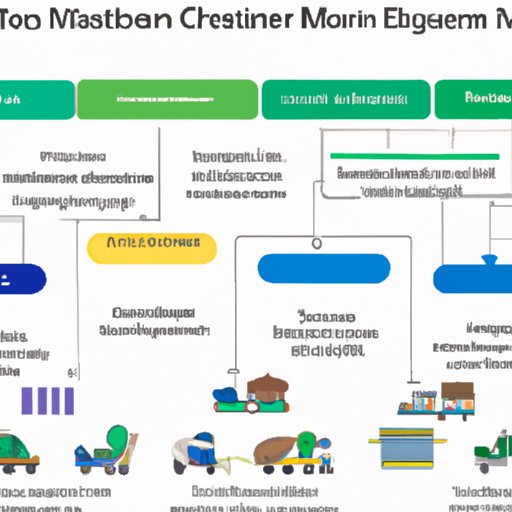Introduction
Waste management businesses provide services to individuals and businesses that enable them to properly dispose of their waste in an environmentally-friendly manner. These businesses offer a variety of services, including collection, transportation, disposal, and recycling of waste materials. With the growing concern about the environment, there has been an increased demand for waste management services, making this an attractive business opportunity.

Overview of Waste Management Businesses
Waste management businesses are responsible for collecting, transporting, disposing, and recycling various types of waste materials. This includes everything from paper, plastic, and food scraps to hazardous materials such as chemicals and medical waste. The waste management industry is divided into two main segments: residential and commercial. Residential waste management businesses focus on providing services to households, while commercial waste management businesses specialize in providing services to businesses and other organizations.
Benefits of Running a Waste Management Business
Running a waste management business can be a lucrative and rewarding venture. Not only does it provide job security and a steady stream of income, but it also offers a unique opportunity to make a positive impact on the environment. According to a study by the University of California at Berkeley, “Waste management businesses have the potential to reduce landfill waste, improve air quality, conserve natural resources, and create jobs in the community.” Furthermore, the waste management industry is expected to grow significantly in the years to come, which means that now is the perfect time to get involved.

Steps to Starting a Waste Management Business
Starting a waste management business requires careful planning and preparation. Here are the steps to take when starting a waste management business:
1. Research the Industry and Develop a Plan
The first step in starting a waste management business is to research the industry and develop a detailed plan. This should include information about the waste management services you plan to offer, the target market, pricing structure, and any other relevant details. You should also research the competition in the area and determine how you can differentiate your business from theirs.
2. Obtain Necessary Licenses and Permits
Once you have developed a plan for your business, you will need to obtain the necessary licenses and permits from the local, state, and federal governments. This process can be lengthy and complicated, so it is important to do your research beforehand to ensure that you are in compliance with all applicable laws and regulations.
3. Acquire Equipment and Supplies
You will need to purchase or rent the necessary equipment and supplies for your business, such as collection bins, trucks and trailers, dumpsters, and recycling equipment. The cost of these items can vary depending on the type and size of your business. Additionally, you may need to invest in additional safety equipment to protect both your employees and customers.
4. Establish Relationships with Clients
Once you have acquired the necessary equipment and supplies, you will need to establish relationships with potential clients. This can be done through networking, cold calling, and advertising. It is important to build trust and credibility with your clients in order to ensure repeat business.
5. Develop an Effective Waste Management Strategy
In order to effectively manage the waste generated by your clients, you will need to develop an effective waste management strategy. This should include procedures for collecting, transporting, disposing, and recycling waste materials in an efficient and eco-friendly manner. It is also important to stay up to date on any changes in regulations or technology that may affect your business.

Necessary Equipment and Supplies for Operating a Waste Management Business
The following are some of the most common pieces of equipment and supplies needed to operate a successful waste management business:
1. Collection Bins
Collection bins are used to store and transport waste materials. They come in a variety of sizes and shapes, and can be made of plastic, metal, or even cardboard. Depending on the type of business you are operating, you may need multiple types of collection bins.
2. Trucks and Trailers
Trucks and trailers are essential for transporting waste materials from one location to another. The size and type of truck or trailer you need will depend on the type and amount of waste you need to transport.
3. Dumpsters
Dumpsters are large containers used to store and transport waste materials. They come in a variety of sizes and can be made of plastic, metal, or concrete. Depending on the size of your business, you may need multiple dumpsters.
4. Recycling Equipment
Recycling equipment is used to separate recyclable materials from non-recyclable materials. This includes sorting machines, balers, and compactors. Investing in high-quality recycling equipment can help you reduce waste, conserve natural resources, and increase profitability.
Licensing Requirements and Regulations for a Waste Management Business
It is important to understand the various licensing requirements and regulations for a waste management business. These include:
1. Federal and State Regulations
Federal and state regulations dictate the types of waste materials that can be collected, transported, and disposed of. It is important to familiarize yourself with these regulations and ensure that you are in compliance with them.
2. Local Laws
In addition to federal and state regulations, you must also comply with local laws regarding waste management. This includes obtaining the proper permits and licenses from your local government.
3. Environmental Regulations
Environmental regulations dictate how waste materials should be handled and disposed of in order to minimize environmental damage. These regulations vary from state to state, so it is important to familiarize yourself with the regulations in your area.
Challenges of Running a Waste Management Business
Although running a waste management business can be profitable and rewarding, there are some challenges associated with it. These include:
1. Liability Issues
Due to the nature of the business, waste management businesses are exposed to potential liability issues. This includes potential legal action if waste materials are not disposed of properly. It is important to have a comprehensive insurance policy to protect your business from potential lawsuits.
2. High Costs of Equipment and Supplies
The cost of equipment and supplies for a waste management business can be quite high. This includes the purchase or rental of trucks, trailers, and other pieces of equipment. Additionally, you may need to hire additional staff to help with the collection and transportation of waste materials.
3. Difficulty Finding Clients
Finding new clients can be challenging, especially in the early stages of your business. Networking, cold calling, and advertising can help you find new clients, but it is important to stay patient and persistent.
4. Lack of Knowledge Regarding Regulations
Understanding the various regulations and laws related to waste management can be difficult. It is important to educate yourself on these matters and consult with experts if necessary.
Conclusion
Starting a waste management business can be a lucrative and rewarding venture. However, it requires careful planning and preparation. This includes researching the industry, developing a plan, obtaining necessary licenses and permits, acquiring equipment and supplies, establishing relationships with clients, and developing an effective waste management strategy. Additionally, it is important to understand the various regulations and laws related to waste management in order to remain compliant. While running a waste management business can be challenging, the rewards can be great.
(Note: Is this article not meeting your expectations? Do you have knowledge or insights to share? Unlock new opportunities and expand your reach by joining our authors team. Click Registration to join us and share your expertise with our readers.)
